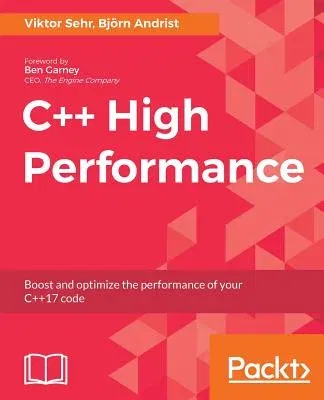Write code that scales across CPU registers, multi-core, and machine
clusters
Key Features:
-
Explore concurrent programming in C++
-
Identify memory management problems
-
Use SIMD and STL containers for performance improvement
Book Description:
C++ is a highly portable language and can be used to write both
large-scale applications and performance-critical code. It has evolved
over the last few years to become a modern and expressive language. This
book will guide you through optimizing the performance of your C++ apps
by allowing them to run faster and consume fewer resources on the device
they're running on without compromising the readability of your code
base.
The book begins by helping you measure and identify bottlenecks in a C++
code base. It then moves on by teaching you how to use modern C++
constructs and techniques. You'll see how this affects the way you write
code. Next, you'll see the importance of data structure optimization and
memory management, and how it can be used efficiently with respect to
CPU caches. After that, you'll see how STL algorithm and composable
Range V3 should be used to both achieve faster execution and more
readable code, followed by how to use STL containers and how to write
your own specialized iterators.
Moving on, you'll get hands-on experience in making use of modern C++
metaprogramming and reflection to reduce boilerplate code as well as in
working with proxy objects to perform optimizations under the hood.
After that, you'll learn concurrent programming and understand lock-free
data structures. The book ends with an overview of parallel algorithms
using STL execution policies, Boost Compute, and OpenCL to utilize both
the CPU and the GPU.
What You Will Learn:
-
Benefits of modern C++ constructs and techniques
-
Identify hardware bottlenecks, such as CPU cache misses, to boost
performance
-
Write specialized data structures for performance-critical code
-
Use modern metaprogramming techniques to reduce runtime calculations
-
Achieve efficient memory management using custom memory allocators
-
Reduce boilerplate code using reflection techniques
-
Reap the benefits of lock-free concurrent programming
-
Perform under-the-hood optimizations with preserved readability using
proxy objects
-
Gain insights into subtle optimizations used by STL algorithms
-
Utilize the Range V3 library for expressive C++ code
-
Parallelize your code over CPU and GPU, without compromising
readability
Who this book is for:
If you're a C++ developer looking to improve the speed of your code or
simply wanting to take your skills up to the next level, then this book
is perfect for you.


